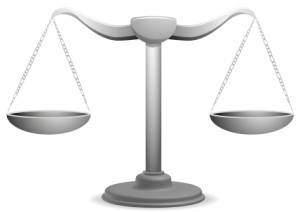I don’t think fairness means that you give equal time to every point of view no matter how marginal. You weigh the sides, you do some truth-testing, you apply judgment to them.
Bill Keller, an American journalist
 How often have you heard an employee complaining, “It just isn’t fair!?” I would guess repeatedly.
How often have you heard an employee complaining, “It just isn’t fair!?” I would guess repeatedly.
Fairness is often an expectation from your workforce despite there being a strong subjective element embedded deeply within their definition.
Unfortunately, the prospect of Fairness by employees activates an attitude counter to building a successful, long-term career. You see not only is Fairness a nebulous concept, but it also creates unrealistic expectations that vary from employee-to-employee, from company-to-company, from human experience-to-human experience.
As I contemplate executives I’ve coached through the years, those who habitually pursue Fairness are following a pathway leading to resentment, hopelessness, and victimization. All of which are at odds with leadership think. This quest for Fairness is contrary to the mindset companies seek to develop in their work environment.
Executives who respond with a solution approach in the midst of perceived unfairness end up far more successful. Why? A solution approach demonstrates leadership character. It has you focusing on what I or together we can do to blow past challenges on the way to creating optimal results. Such a perspective develops mental muscle that prepares you to meet business and life challenges rather than hoping someone higher in the organization will fix the problem. And isn’t this who you want to be and more importantly, isn’t this how you want your employees to respond to the tough patches you face in business?
Putting my personal philosophy aside, I’ve made a commitment to pass along material regarding the Via Character Strengths as a way of boosting your leadership presence, so let’s explore how to interpret Fairness in the business world utilizing this particular instrument.
How do you measure up in Fairness?
If you live with the core belief that fairly treating all employees is a vital leadership quality, chances are one of your Character Strengths is Fairness. You understand that Fairness doesn’t mean treating everyone equally—that would create chaos since each of your employees is unique with widely-varying expectations—rather it is managing your workforce from a balanced business perspective. This character has you being open-minded, accepting, and fascinated by the point-of-view of others as you make your business decisions.
What is a “just right” Fairness?
To the best of your abilities, it is creating an environment that includes transparency and cultivates an even playing field for all employees, which openly communicates corporate policies, promotes constructive feedback, encourages the support of the individual, and provides an impartial appeals process when necessary. It is a focus on right or wrong, and yet as you know rarely is anything in life or the workplace entirely black or white which is where insightful, sensitive and balanced leadership acumen comes into play.
What are some simple shifts you can make to engage your Fairness?
- The Human Factor: Research from the Karolinska Institute and Stockholm School of Economics shows that our brain has a built-in mechanism that triggers an automatic reaction if someone refuses to share equitably.[i] We are hardwired to want a fair world. And yet, as mentioned earlier, the problem with this is the perception of Fairness varies from person-to-person which is why this trait is so difficult for leaders to administer in their work environment. When you ask open-ended, “exploring for gold” questions from the beginning of any relationship, you have the ability to identify employee beliefs that are in sync or contrary with the corporate culture. This gap in understanding provides an opportunity for you to address any misalignments, and then, proactively communicate the company’s expectations individually and corporately. It is not only your job it is one of the reasons you receive that big paycheck. The reward for your efforts is an employee population who are motivated and more likely to internalize your company’s goals and values.
- The Inequality Factor: Unfairness appears to be aroused more in those who are subordinates than those in leadership roles. The cries of unfairness typically originate from employees who feel they have no power to change the situation, but others, namely you with higher authority, do have the ability to bring about parity! This sense of inequality is what has your workforce up in arms. As a leader, it is true you are responsible for upholding your corporation’s policies and procedures—with sensitivity—but that doesn’t mean you can ever achieve Fairness according to each and every employees’ individual rulebook.
Can you overdo Fairness?
Yes, you can overdo Fairness by doggedly hanging onto your beliefs without allowing room for another person’s point of view to see the light of day. Playing by the rules is fair; and at the same time, it is clear that rules don’t always create Fairness which makes objectivity the key to success. As much as you may attempt to bring your logic to the Fairness conflict until the other person grasps that you realize and appreciate their position, no attitude shift will occur. If you are unable to create a transformative “Aha,” it will be difficult for the other person to accept that any decision made is fair.
Do you know your strengths?
I hope you found value from this dialogue regarding Fairness both from my personal point-of-view and that of Via Charter Strengths’ perspective. It is a knotty issue one each executive must wrestle with as they come to their own and their company’s Fairness way of behaving and transacting in their business environment.
Do you want to dig deeper into your leadership character? I’d love for us to have a Wisdom Dialogue with you that creates a life and career that is in integrity with who you are and is both fulfilling and fun for YOU. The easiest way to reach out is to click this link, schedule a FREE 10-Minute call to discuss your career with an eye on your hopes and aspirations and how to realize them. I want you to fulfill the future you’ve dreamt of having. I can’t wait for us to bring it into being!
Resource:
Even monkeys have a rudimentary concept of Fairness as you will see in this pertinent, funny, three-minute excerpt from a TedTalk video by Emory University’s primatologist and ethologist Professor Frans de Waal.
